Spider classification guide
Home » Science Education » Spider classification guideSpider classification guide
Spider Classification Guide. Spider identification guide the majority of spider species are not easily identified by the non expert. Browse spiders acacesia hamata. Spider classification and physiology. Spiders are grouped into various genera.
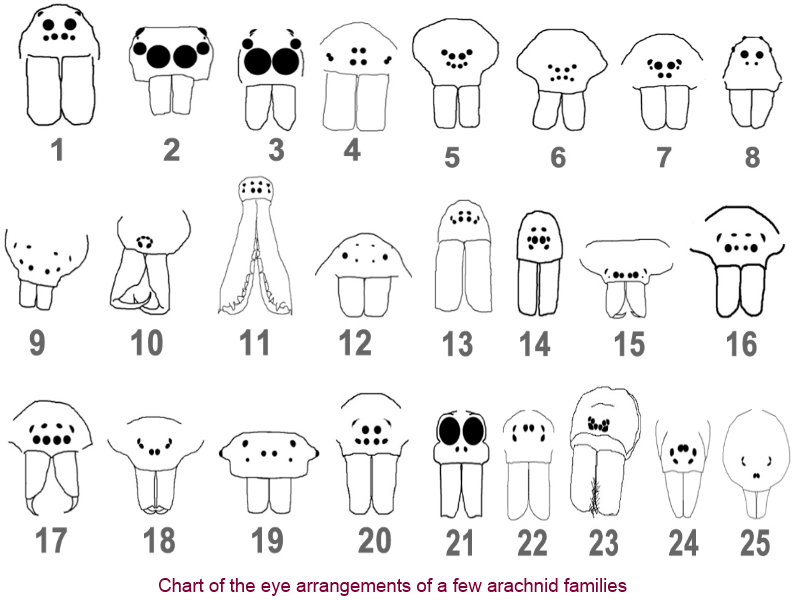 Spider Identification By Eye Arrangement The Biologist Apprentice From thebiologistapprentice.com
Spider Identification By Eye Arrangement The Biologist Apprentice From thebiologistapprentice.com
Arthropods are invertebrates with an exoskeleton. Spiders are grouped into various genera. Are all spiders poisonous. All spiders have two body regions cephalothorax and unsegmented abdomen eight legs each with seven segments a pair of pedipalps a pair of chelicerae jaws and either six or eight simple eyes. In addition this guide will help you identify other species commonly found in basements garages and gardens throughout the world. Among the more than 48 000 species of spiders are black spiders brown and black spiders little red spiders and even white spiders.
Mygalomorph spiders have reduced spinnerets dagger like fangs and two pairs of book lungs similar to ancestral ground living spiders.
For a more advanced view of spiders currently covered by spider id you can also navigate the spider taxonomy. Spiders are arthropods that belong to the class of animals named arachnida and order araneae. Arthropods are invertebrates with an exoskeleton. For a more advanced view of spiders currently covered by spider id you can also navigate the spider taxonomy. All spiders have a pair of poison glands with ducts that supply venom to the hollow jaws chelicerae. First we ll look at the two kinds of spiders in north america that are potentially dangerous to humans widow and recluse spiders.
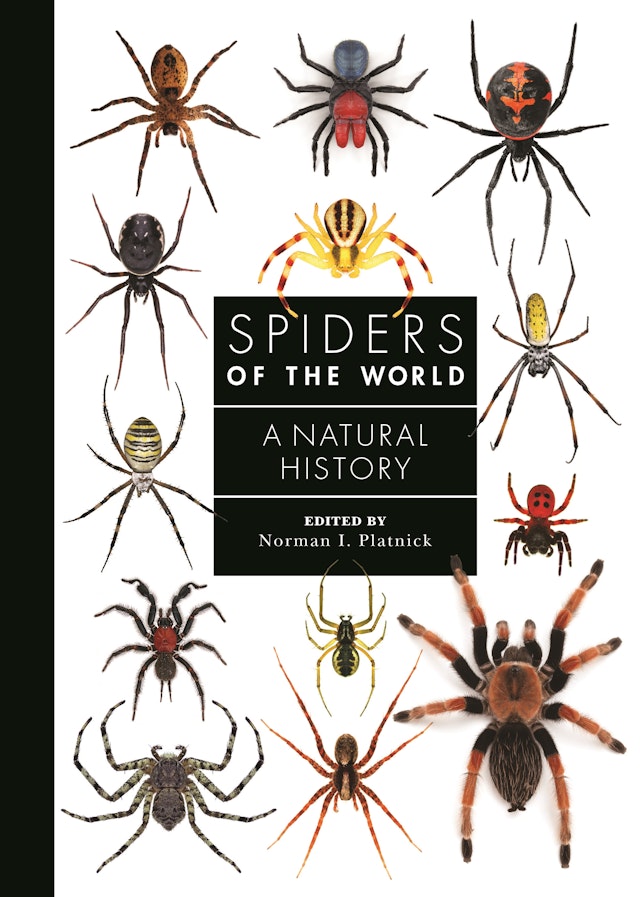 Source: press.princeton.edu
Source: press.princeton.edu
For a more advanced view of spiders currently covered by spider id you can also navigate the spider taxonomy. Spider identification guide the majority of spider species are not easily identified by the non expert. All spiders have a pair of poison glands with ducts that supply venom to the hollow jaws chelicerae. Spider classification and physiology. Are all spiders poisonous.
 Source: pinterest.com
Source: pinterest.com
Spiders are arthropods that belong to the class of animals named arachnida and order araneae. Spiders are arthropods that belong to the class of animals named arachnida and order araneae. Browse spiders acacesia hamata. Suborder mesothelae segmented spiders. All spiders have a pair of poison glands with ducts that supply venom to the hollow jaws chelicerae.
 Source: thebiologistapprentice.com
Source: thebiologistapprentice.com
However like insects and crustaceans they belong to a subgroup within the phylum arthropod. Arthropods are invertebrates with an exoskeleton. Are all spiders poisonous. Spider classification and physiology. All spiders have two body regions cephalothorax and unsegmented abdomen eight legs each with seven segments a pair of pedipalps a pair of chelicerae jaws and either six or eight simple eyes.
 Source: pinterest.com
Source: pinterest.com
Spider taxonomy is that part of taxonomy that is concerned with the science of naming defining and classifying all spiders members of the araneae order of the arthropod class arachnida with about 46 000 described species however there are likely many species that have escaped the human eye to this day and many specimens stored in collections waiting to be described and classified. All spiders have a pair of poison glands with ducts that supply venom to the hollow jaws chelicerae. All spiders have two body regions cephalothorax and unsegmented abdomen eight legs each with seven segments a pair of pedipalps a pair of chelicerae jaws and either six or eight simple eyes. For a more advanced view of spiders currently covered by spider id you can also navigate the spider taxonomy. Are all spiders poisonous.
 Source: pinterest.com
Source: pinterest.com
Spiders are not insects. First we ll look at the two kinds of spiders in north america that are potentially dangerous to humans widow and recluse spiders. Spiders are grouped into various genera. Infraorder mygalomorphae ancient spiders such as tarantulas trapdoor and funnel web spiders. Spider taxonomy is that part of taxonomy that is concerned with the science of naming defining and classifying all spiders members of the araneae order of the arthropod class arachnida with about 46 000 described species however there are likely many species that have escaped the human eye to this day and many specimens stored in collections waiting to be described and classified.
 Source: en.wikipedia.org
Source: en.wikipedia.org
Yes to their prey. Spider taxonomy is that part of taxonomy that is concerned with the science of naming defining and classifying all spiders members of the araneae order of the arthropod class arachnida with about 46 000 described species however there are likely many species that have escaped the human eye to this day and many specimens stored in collections waiting to be described and classified. Infraorder mygalomorphae ancient spiders such as tarantulas trapdoor and funnel web spiders. In addition this guide will help you identify other species commonly found in basements garages and gardens throughout the world. Spider search allows you to narrow down a spider s species by both unique identifying traits and primary colors.
 Source: field-studies-council.org
Source: field-studies-council.org
Spiders are grouped into various genera. Mygalomorph spiders have reduced spinnerets dagger like fangs and two pairs of book lungs similar to ancestral ground living spiders. This spider identification guide will help you identify the spider you have found. Spiders are arthropods that belong to the class of animals named arachnida and order araneae. Infraorder mygalomorphae ancient spiders such as tarantulas trapdoor and funnel web spiders.
 Source: etawau.com
Source: etawau.com
Spiders are not insects. Among the more than 48 000 species of spiders are black spiders brown and black spiders little red spiders and even white spiders. Spiders are arthropods that belong to the class of animals named arachnida and order araneae. Infraorder mygalomorphae ancient spiders such as tarantulas trapdoor and funnel web spiders. In addition this guide will help you identify other species commonly found in basements garages and gardens throughout the world.
 Source: field-studies-council.org
Source: field-studies-council.org
This spider identification guide will help you identify the spider you have found. Spider search allows you to narrow down a spider s species by both unique identifying traits and primary colors. Infraorder mygalomorphae ancient spiders such as tarantulas trapdoor and funnel web spiders. Suborder mesothelae segmented spiders. Spiders are not insects.
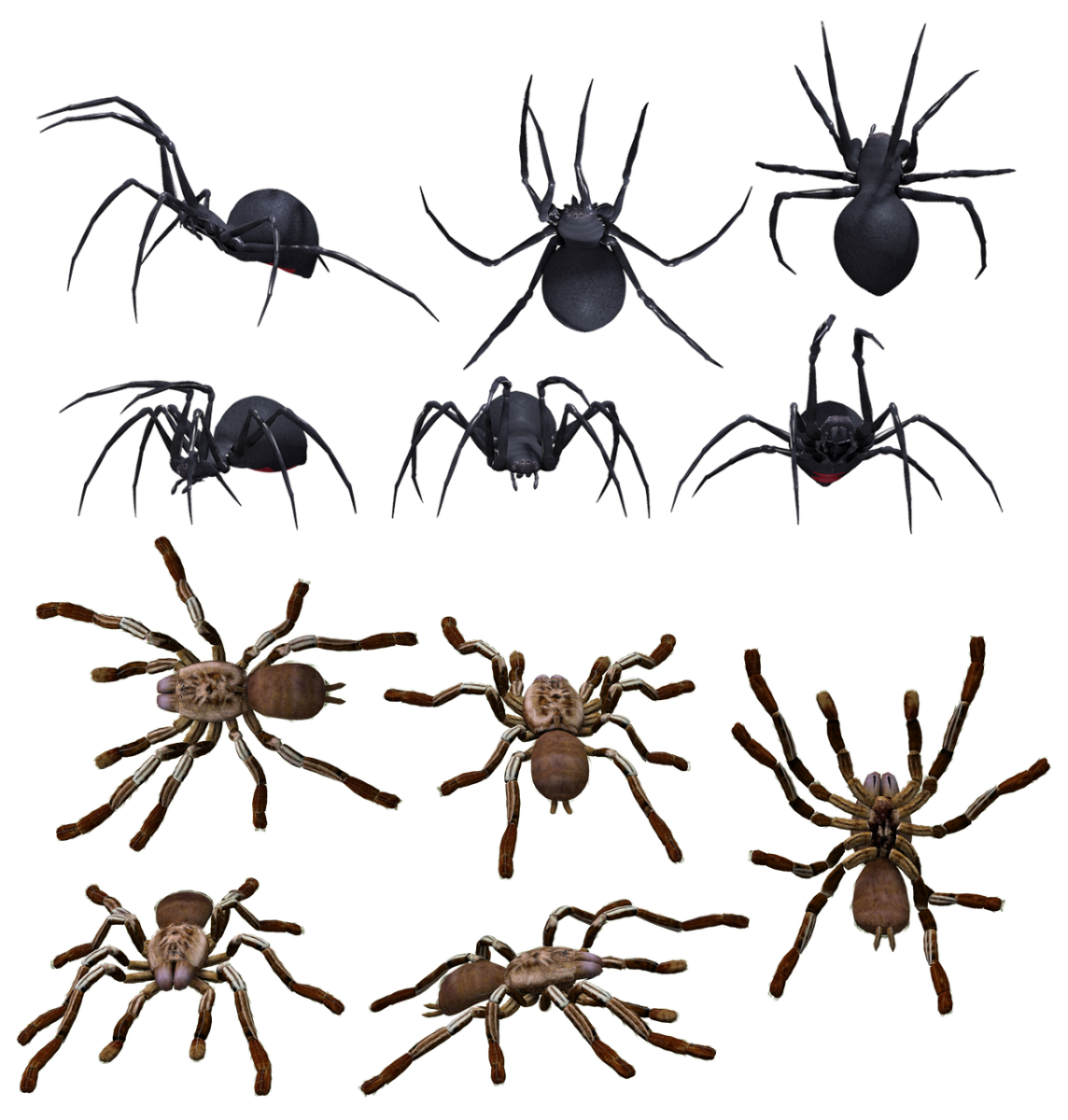 Source: owlcation.com
Source: owlcation.com
Suborder opisthothelae includes all other spiders. Spider taxonomy is that part of taxonomy that is concerned with the science of naming defining and classifying all spiders members of the araneae order of the arthropod class arachnida with about 46 000 described species however there are likely many species that have escaped the human eye to this day and many specimens stored in collections waiting to be described and classified. Are all spiders poisonous. In addition this guide will help you identify other species commonly found in basements garages and gardens throughout the world. Spider classification and physiology.
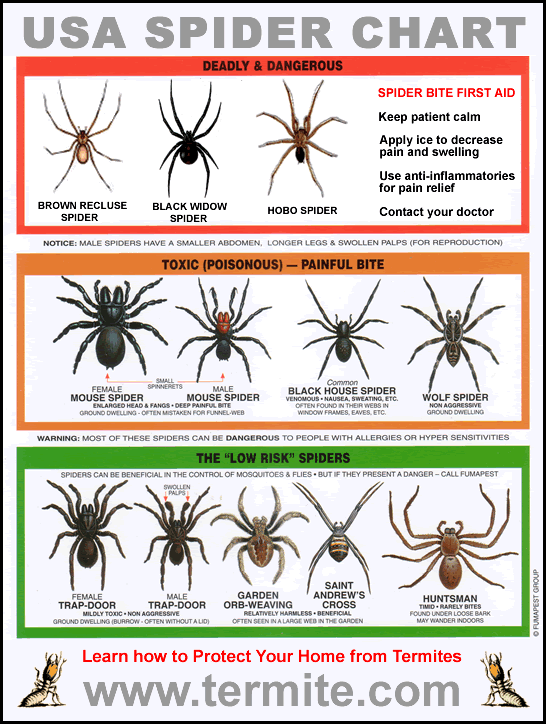 Source: termite.com
Source: termite.com
All spiders have a pair of poison glands with ducts that supply venom to the hollow jaws chelicerae. Spider search allows you to narrow down a spider s species by both unique identifying traits and primary colors. First we ll look at the two kinds of spiders in north america that are potentially dangerous to humans widow and recluse spiders. However like insects and crustaceans they belong to a subgroup within the phylum arthropod. For a more advanced view of spiders currently covered by spider id you can also navigate the spider taxonomy.
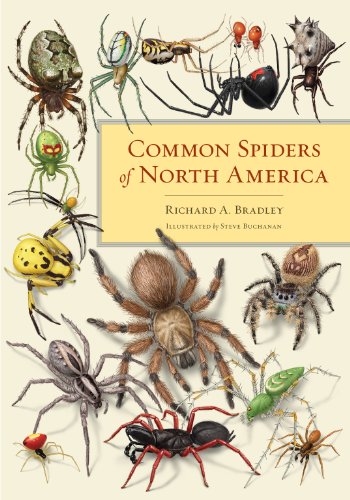 Source: bookauthority.org
Source: bookauthority.org
Among the more than 48 000 species of spiders are black spiders brown and black spiders little red spiders and even white spiders. Mygalomorph spiders have reduced spinnerets dagger like fangs and two pairs of book lungs similar to ancestral ground living spiders. Among the more than 48 000 species of spiders are black spiders brown and black spiders little red spiders and even white spiders. Spider taxonomy is that part of taxonomy that is concerned with the science of naming defining and classifying all spiders members of the araneae order of the arthropod class arachnida with about 46 000 described species however there are likely many species that have escaped the human eye to this day and many specimens stored in collections waiting to be described and classified. Arthropods are invertebrates with an exoskeleton.
 Source: domyown.com
Source: domyown.com
Suborder opisthothelae includes all other spiders. Mygalomorph spiders have reduced spinnerets dagger like fangs and two pairs of book lungs similar to ancestral ground living spiders. Arthropods are invertebrates with an exoskeleton. Among the more than 48 000 species of spiders are black spiders brown and black spiders little red spiders and even white spiders. First we ll look at the two kinds of spiders in north america that are potentially dangerous to humans widow and recluse spiders.
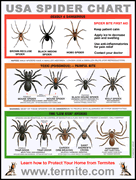 Source: termite.com
Source: termite.com
All spiders have a pair of poison glands with ducts that supply venom to the hollow jaws chelicerae. Spider taxonomy is that part of taxonomy that is concerned with the science of naming defining and classifying all spiders members of the araneae order of the arthropod class arachnida with about 46 000 described species however there are likely many species that have escaped the human eye to this day and many specimens stored in collections waiting to be described and classified. For a more advanced view of spiders currently covered by spider id you can also navigate the spider taxonomy. All spiders have two body regions cephalothorax and unsegmented abdomen eight legs each with seven segments a pair of pedipalps a pair of chelicerae jaws and either six or eight simple eyes. First we ll look at the two kinds of spiders in north america that are potentially dangerous to humans widow and recluse spiders.
 Source: nhm.ac.uk
Source: nhm.ac.uk
Spiders are not insects. All spiders have a pair of poison glands with ducts that supply venom to the hollow jaws chelicerae. Infraorder mygalomorphae ancient spiders such as tarantulas trapdoor and funnel web spiders. Spiders are grouped into various genera. Yes to their prey.
If you find this site beneficial, please support us by sharing this posts to your favorite social media accounts like Facebook, Instagram and so on or you can also save this blog page with the title spider classification guide by using Ctrl + D for devices a laptop with a Windows operating system or Command + D for laptops with an Apple operating system. If you use a smartphone, you can also use the drawer menu of the browser you are using. Whether it’s a Windows, Mac, iOS or Android operating system, you will still be able to bookmark this website.
